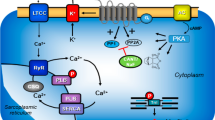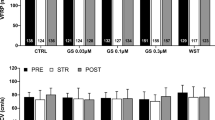Abstract
The mechanism by which glibenclamide regulates mechanically activated atrial natriuretic peptide (ANP) secretion was investigated using isolated perfused rat atria. A reduction in atrial pressure from an experimentally imposed distending pressure stimulated the secretion of ANP and caused concomitant translocation of extracellular fluid (ECF) into the atrial lumen. The activation of ANP secretion and ECF translocation were closely correlated with atrial volume changes and the increase in ANP secretion was a function of the ECF translocation. Glibenclamide (1, 10, 100 μM), an ATP-sensitive K+ (K+ ATP) channel blocker, had no effect on the basal secretion of ANP, suppressed the stimulation of stretch-activated ANP secretion in a dose-dependent manner, but not the translocation of the ECF. Glipizide (100 μM) and tolbutamide (100 μM), other K+ ATP channel blockers, had similar effects to those of glibenclamide. Suppression by glibenclamide (100 μM) of the stretch-induced ANP secretion was not observed in atria that had been pretreated with pinacidil (200 μM), an ATP-sensitive K+ channel opener: pinacidil alone had no effect on ECF translocation and ANP secretion. Furthermore, blocking Ca2+ influx by using the Ca2+ channel blocker diltiazem (10 nM), or a Ca2+-depleted medium prevented the suppression of stretch-induced ANP secretion by glibenclamide. In other experiments, atrial distension produced a slight membrane depolarization of cardiomyocytes; this was accentuated in the presence of glibenclamide. Furthermore, in single cardiomyocytes, glibenclamide increased the intracellular Ca2+ concentration ([Ca2+]i) in a dose-dependent manner. From these results, we suggest that glibenclamide suppresses atrial release of ANP by blocking K+ ATP channels and increasing Ca2+ influx and that the K+ ATP channels are associated with the regulation of the mechanically activated ANP secretion from the atria.
Similar content being viewed by others
Author information
Authors and Affiliations
Additional information
Received: 13 May 1996 / Received after revision: 10 February 1997 / Accepted: 5 March 1997
Rights and permissions
About this article
Cite this article
Kim, S., Cho, K., Chang, S. et al. Glibenclamide suppresses stretch-activated ANP secretion: involvements of K+ ATP channels and L-type Ca2+ channel modulation. Pflügers Arch 434, 362–372 (1997). https://doi.org/10.1007/s004240050409
Issue Date:
DOI: https://doi.org/10.1007/s004240050409




